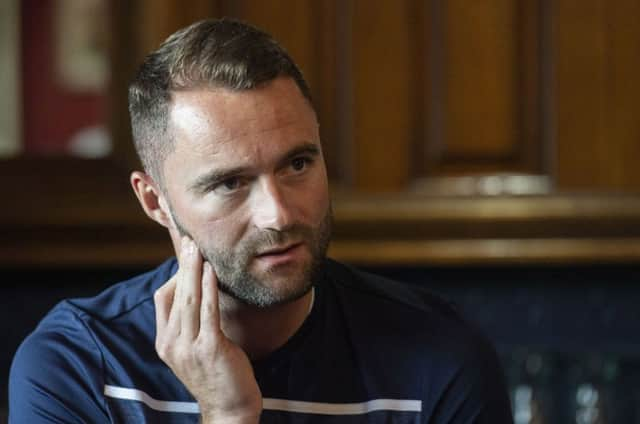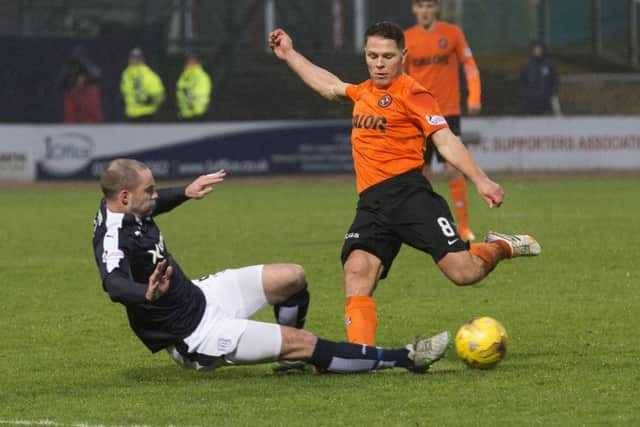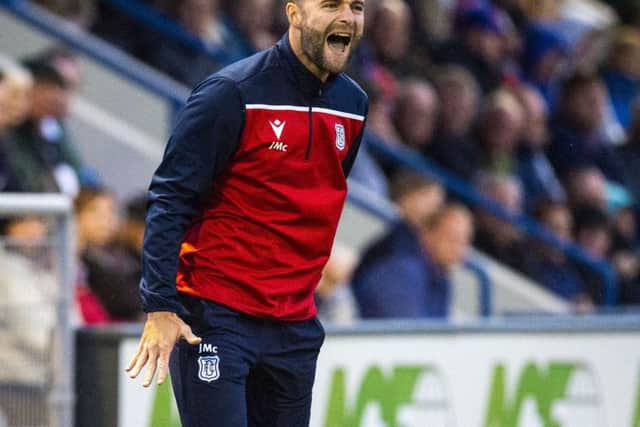Interview: Dundee manager James McPake on how the club helped him after the death of his father


A mangled left knee told you as much.
When these worst fears were realised, when the decision was finally made to quit all the comeback attempts and get on with living, imagine being offered a job that meant the world to you, because, as much as anything, it provided licence to move on from the crunching tackle that changed everything, and threatened to define your life.
And imagine being led to your new office which comes as part of this new opportunity and… it overlooks the spot, around 30 yards away, where the horror moment occurred.
Advertisement
Hide AdAdvertisement
Hide Ad

Indeed, the rectangular window frame effectively frames it. There might as well be a picture of the sickening clash sitting on the desk. It’s hard enough to train the mind to avoid flashbacks without this daily reminder each time you look up.
James McPake has already moved the home dugout at Dens Park since taking over as manager earlier this summer. Did he not consider making a request for an office that wasn’t placed with such insensitive disregard to the events of 2 January 2016?
He can’t ever forget what happened around 15 minutes into a fiercely contested Dundee derby. In a way, it’s made him the man he is today. It certainly set him on the path to where he is now. Knowledge of this helps with reconciling himself to the premature end of a more-than-decent playing career.
United worked a short corner to the edge of the box, which Dundee had not expected. As soon as McPake saw this, he thought: ‘the nearest man needs to get out and block that’. He quickly realised he was the nearest man.


McPake shot out towards Dundee United’s John Rankin, who had taken a touch and was preparing to send a shot goalwards. McPake slid in.
“I knew it was bad right away,” he says. “Of course I have watched it back. People say they do not watch it back, of course you do. It was a derby, blood and guts. The pitch was slick. We had had a poor result up at Ross County, where we lost 5-2, so we knew we needed to bounce back.”
His wife, Dawn, was at the game. She did not normally come, but was there with their two children, Ailey and Sophie (another is currently pending, more of which later). “She was brought into the office here – Paul’s office then obviously.”
He is referring to Paul Hartley, who signed him when many others were sceptical about the defender’s ability to shake off a long-running back injury dating back to a meeting with Rory Fallon’s knee during a clash between Ipswich Town and McPake’s Coventry City. Helping Dundee into the top six in 2014-15, McPake had proved the doubters wrong. It wasn’t meant to end like this, aged only 31 and with face buried in the sodden turf in an attempt to muffle screams of agony.
Advertisement
Hide AdAdvertisement
Hide AdThere was an ambulance sitting in the street. He was taken straight out. “I heard the roar,” he says. “I had given the free-kick away and they’d scored.
“My only worry was that we needed to get back into the game.” That and the criticism he knew would be levelled at him. Same old McPake, they’d be saying. Reckless. Cavalier. As liable to do himself an injury as others.
“I didn’t know bad it was. But I knew it was bad,” he says. “The knee was not bending. I am thinking, someone needs to get my phone, I need to phone my maw, and tell her. She never watches me play, not on the telly either. But she will be worried.”
Dawn told him she had her phone and would ring her. McPake still wanted his own phone. “Why?” he was asked. “Because I need to see it back, I need to see whether the tackle was that bad. I like Ranks…
“I knew everyone was going to say I deserved it for the tackle. I had to work that out. If I had not charged out, and Ranks had put it in the top corner, I would be kicking myself.
“Foul yes, a red card? No, not for me. It was not a red card for John Rankin either. He said that.”
McPake was still lying in the back of an ambulance outside the main stand when he heard Dundee score an equaliser. They later grabbed a winner. “I genuinely mean it, I was happy,” he says. “Because I’d given away the free-kick. I was not worried about my knee. I was on morphine, the worry was losing the game because of the free-kick I gave away. I was happy. We won the game.”
Having arrived at Ninewells, he was anaesthetised before being X-rayed because he still could not straighten his leg. “I was thinking, I have had injuries before, this is not quite right. Quite quickly we knew how bad it was.
Advertisement
Hide AdAdvertisement
Hide Ad“We were told it could be career ending. But I was told my back injury could be career ending. I got back from that. That was my mindset. I will come back from this. I nearly got there.”
He did as well, overcoming two serious setbacks. The first occurred when he re-fractured the knee while on an exercise bike. “That was a hammer blow, that one,” he says. Dundee sought out the best person they could in order to give McPake new impetus. He brightened when he saw Louis Saha sitting in top knee specialist Andy Williams’ London waiting room. McPake learned why even star footballers had to wait in line. “People say to me you must have played against some top, top players,” he says. “I mean I played Chelsea when I was at Coventry, Didier Drogba and John Terry. They have an aura. But no one had an aura like Andy Williams did for me.”
McPake was back on the road to recovery but then came an incident to test the spirit of even the toughest, most determined athlete. Visiting his sister, he stumbled on decking while en route to the jacuzzi. “I felt something,” he recalls. “What was that?!” His quadriceps tendon had snapped. A return visit to Williams followed and a couple of Under 20 appearances gave everyone hope. But then he broke down again at Gussie Park, down the road from Dens. It was over. He announced his retirement in January last year.
It was his decision. The club were prepared to keep on treating him. On top of his salary, McPake estimates Dundee spent “tens of thousands of pounds” on medical bills, including flying him back and forth to London for five consecutive weeks for expensive platelet-rich plasma, or PRP, injections.
It’s almost as if John Nelms, the manging director, knew then what was in store and he was investing in a future Dundee manager. “I am glad the way it’s worked now,” McPake says. “I would not be sitting here now, eventually maybe, but not now.
“There’s people with cancer…” he adds. “I mean, my dad died of cancer. That was the shake I needed to give myself. I was down, and you would be, but there’s people out there who are miles worse off. I had a bad knee but was getting the best treatment, the best surgeons.
“I always had my dad in my head. I mean, what was I complaining about? I have a sore knee. Looking back, it [the injury] was the best thing that could have happened. It allowed me to get on with my coaching.”
Mention of his father, Michael, is pertinent. There’s a photograph of him sitting on his desk. Or at least there’s the photo of his arm lying on a hospital bed next to McPake’s then four-day old daughter. But they are not in a maternity ward. They are in a cancer ward.
Advertisement
Hide AdAdvertisement
Hide Ad“You don’t see my dad’s face, because he had passed just ten minutes or so before the photo was taken,” McPake explains. He consults the dates etched into an arm. “We lost him 14 October, my daughter, Sophie, was born on the 11th. It was pretty sudden. It was a tough time.
“I missed it,” he said, referring to his father’s death. “I did not get home in time. I had to come back down from Dundee. He was a huge influence for me, so that was something else you had to deal with.”
The boy from Salsburgh, near Shotts, whose only real connection to the club previously was that he scored the first senior goal of his career against them in a 1-0 win for Livingston, is now one of Dundee’s greatest fans.
“I don’t go out and say it, because it can sound cheesy, but the way the club have been with me, with injury, with death, with giving me the job, and supporting me to get my coaching badges… This really is a massively significant place for me.”
Life and death, pain and gain. McPake seems to have experienced it all at Dundee in just over five years at the club. He may miss today’s game against Peterhead because he and his wife are awaiting the birth of their third daughter. She was due to be induced last night.
Things have changed. Former Queens Park Rangers manager Trevor Francis, who occupied this space a few weeks ago, once fined a player, Martin Allan, for flying back down from a game in Newcastle to attend the birth of his son. Now it’s the manager who is electing to do so but, as McPake points out, he now has a fresh perspective on things. Family is everything and there will be “many more games as Dundee manager – hopefully”.
It’s not as if McPake does not have sufficiently qualified colleagues to take the strain while he’s away. There’s Jimmy Nicholl, the 73-times capped Northern Ireland international, for starters. Midway through this interview there’s a knock on the door: in walks Gordon Strachan in DFC tie having just been confirmed as the club’s new technical director.
McPake’s been less comfortable about missing games in the past, including the 2013 Scottish Cup final v Celtic when he was with Hibs. It was a huge opportunity for atonement, coming as it did 12 months after the 5-1 debacle v Hearts. McPake scored Hibs’ goal that day but rarely has a goal in a cup final mattered less.
Advertisement
Hide AdAdvertisement
Hide AdAll those bloody loan players, eh? “Yes, I was one of them!” he reminds you. Not that he’s ever been lumped in with the likes of Tom Soares, Matt Doherty and George Francomb because, whatever else you think of James McPake, he’ll never, ever be accused of not caring enough.
His intended shot at redemption was scuppered when he was injured in a win over Hearts a few weeks before the final. He should have gone under the knife again there and then but waited and, having signed on permanently from Coventry City, played only another six times before being sent off in a League Cup tie defeat to Hearts. That was McPake’s last game for the club as well as manager Pat Fenlon’s. Terry Butcher bombed him out, for whatever reason, and Hibs were relegated. “I was fit!” protests McPake. “To be fair I was down to play in Terry’s first game, St Mirren away,” he says. “Again, I shaped up on the Friday and then my back went. The first week he came in I got called up for the Northern Ireland squad away in Turkey, so I went out there to southern Turkey. It was a long journey back. Looking back now I should never have done it because of my back. I came back on the Thursday, trained Friday, and my back went. Would it have changed anything had I been able to play, I do not know.
“He told a lot of boys he wanted rid of them before the end of the season, good players too, good characters, and then had to go back and ask to use them. I still believe if Pat Fenlon was still there, we would have stayed up.”
There was no clash as such with Butcher. “I chapped the door quietly and said: ‘I believe I can help you’. He said: ‘fine, I pick the team’. He said: ‘keep on training’, which I did.
“I will stand by that. I was not happy not playing but I told him: ‘whatever happens at the end of the season, I need to come out and say I was fit, you just weren’t playing me. I am not lying to anyone’.”
When Hibs finally put right 2012 with the win over Rangers four years later, McPake was sitting watching at home – left leg up, a sadly familiar position at his point. But he still managed to celebrate. “More than I have ever done while watching a game on television,” he says.
McPake always gave everything. He proved this from the early days at Livingston, where he started as a centre forward. “I wasn’t good enough, but I played. I could flick the ball on, cause a bit of chaos in the air, but… not great, I am the first to admit that.” Archie Knox, who once occupied the office at Dens Park where we are speaking, was first to broach switching position to centre-half.
“Archie and Richard Gough played me there for the first time, I came on against Celtic for the last ten minutes. I was warned: ‘Don’t give Hartson a kick, he’s on his hat-trick’. Big John scored to make his hat-trick. Actually, he might have scored two in the time I was on…”
Advertisement
Hide AdAdvertisement
Hide AdHe refuses to torment himself with the thought that had he not switched, had he not spent season after season putting his body on the line at centre-half, he might still be playing. “Everything happens for a reason,” he says. And his knee makes a loud and timely click – as if in agreement – as he shifts position in his seat.